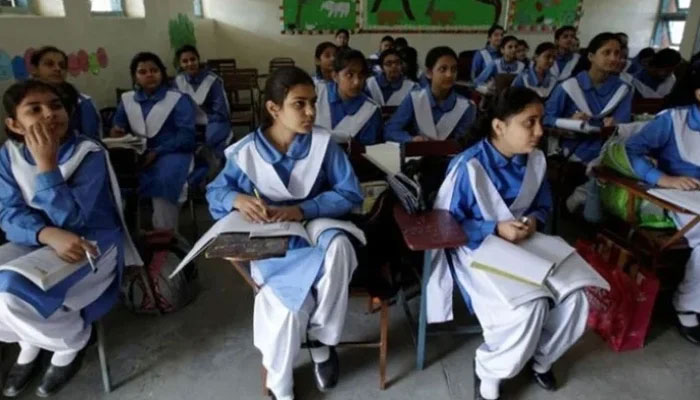80 AJK, GB girls schools to get latest IT equipment
Decision finalized in a meeting chaired by secretary of Federal Education and attended by a Unesco team and senior officials
ISLAMABAD: In a significant development aimed at enhancing digital educational opportunities for marginalized girls, the Ministry of Federal Education and Professional Training in collaboration with the Unesco Pakistan has announced the deployment of advanced IT equipment in 80 government girls schools across Azad Jammu and Kashmir (AJ&K) and Gilgit-Baltistan (GB).
The decision was finalized in a meeting chaired by the secretary Federal Education and attended by a Unesco team and senior officials. The secretary expressed support for the initiative, underscoring its importance in bridging educational disparities in remote areas of Pakistan.
This transformative project is poised to bring smart classroom technology to primary-level girls, equipping schools in eight districts of AJ&K and GB with state-of-the-art IT resources. Smart classrooms utilize interactive tools, digital content, and personalized learning interfaces that allow learners to engage with their curriculum in dynamic and meaningful ways. By integrating these advanced tools, young girls in these regions will benefit from an improved learning environment that fosters creativity, critical thinking and problem-solving skills.
The initiative also includes a customized capacity development programme for teachers, enabling them to integrate technology into teaching and learning process effectively. This programme will prepare teachers to integrate AI-enabled tools into their instructional methods, streamlining the teaching-learning process to ensure that students gain maximum benefit. Training local educators is key to making this transition successful as it empowers them to create an inclusive and supportive learning environment that meets the unique needs of primary school girls in AJ&K and GB.
“This is a valuable gift for the girls of these marginalized areas,” said the secretary. “The new equipment and capacity building of teachers will open doors for young girls to access a world-class education regardless of their location, and it underscores our commitment to equitable and inclusive education.”
The deployment of IT equipment in schools and the training programme for teachers highlight the Ministry and Unesco’s shared vision for an innovative and inclusive educational system in Pakistan. Through these efforts, the girl students stand to gain knowledge and skills needed to thrive in an increasingly digital world.
-
 AI Copyright Battle: ByteDance To Curb Seedance 2.0 Amid Disney Lawsuit Warning
AI Copyright Battle: ByteDance To Curb Seedance 2.0 Amid Disney Lawsuit Warning -
 Savannah Guthrie In Tears As She Makes Desperate Plea To Mom's Kidnappers
Savannah Guthrie In Tears As She Makes Desperate Plea To Mom's Kidnappers -
 Canada’s Defence Industrial Strategy Targets 125,000 Jobs And Export Growth
Canada’s Defence Industrial Strategy Targets 125,000 Jobs And Export Growth -
 Tre Johnson, Former NFL Guard And Teacher, Passes Away At 54
Tre Johnson, Former NFL Guard And Teacher, Passes Away At 54 -
 Jerome Tang Calls Out Team After Embarrassing Home Defeat
Jerome Tang Calls Out Team After Embarrassing Home Defeat -
 Cynthia Erivo Addresses Bizarre Rumour About Her Relationship With Ariana Grande
Cynthia Erivo Addresses Bizarre Rumour About Her Relationship With Ariana Grande -
 Prince Harry, Meghan Markle Spotted Cosying Up At NBA All-Star Game
Prince Harry, Meghan Markle Spotted Cosying Up At NBA All-Star Game -
 Lady Gaga Explains How Fibromyalgia Lets Her 'connect With People Who Have It'
Lady Gaga Explains How Fibromyalgia Lets Her 'connect With People Who Have It' -
 Metro Detroit Weather Forecast: Is The Polar Vortex Coming Back?
Metro Detroit Weather Forecast: Is The Polar Vortex Coming Back? -
 Daniel Radcliffe Reveals Surprising Way Fatherhood Changed Him
Daniel Radcliffe Reveals Surprising Way Fatherhood Changed Him -
 ‘Disgraced’ Andrew At Risk Of Breaking Point As Epstein Scandal Continues
‘Disgraced’ Andrew At Risk Of Breaking Point As Epstein Scandal Continues -
 Alan Cumming Shares Plans With 2026 Bafta Film Awards
Alan Cumming Shares Plans With 2026 Bafta Film Awards -
 OpenClaw Founder Peter Steinberger Hired By OpenAI As AI Agent Race Heats Up
OpenClaw Founder Peter Steinberger Hired By OpenAI As AI Agent Race Heats Up -
 Kate Middleton's Reaction To Harry Stepping Back From Royal Duties Laid Bare
Kate Middleton's Reaction To Harry Stepping Back From Royal Duties Laid Bare -
 Rose Byrne Continues Winning Streak After Golden Globe Awards Victory
Rose Byrne Continues Winning Streak After Golden Globe Awards Victory -
 Ice Hockey Olympics Update: Canada Stays Unbeaten With Dominant Win Over France
Ice Hockey Olympics Update: Canada Stays Unbeaten With Dominant Win Over France




